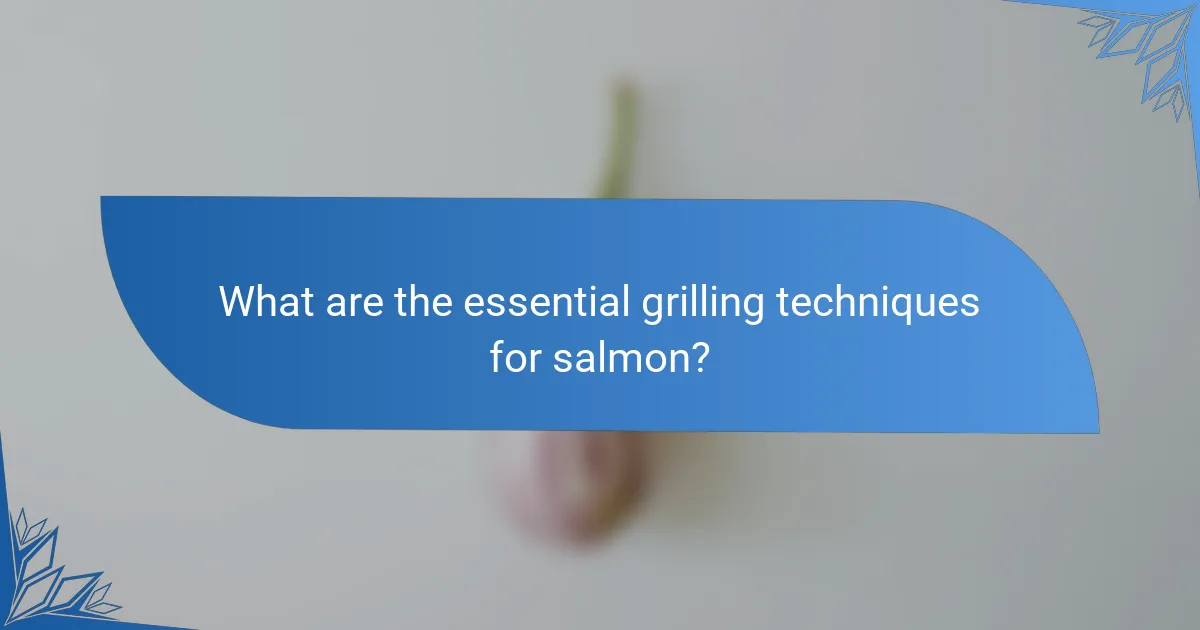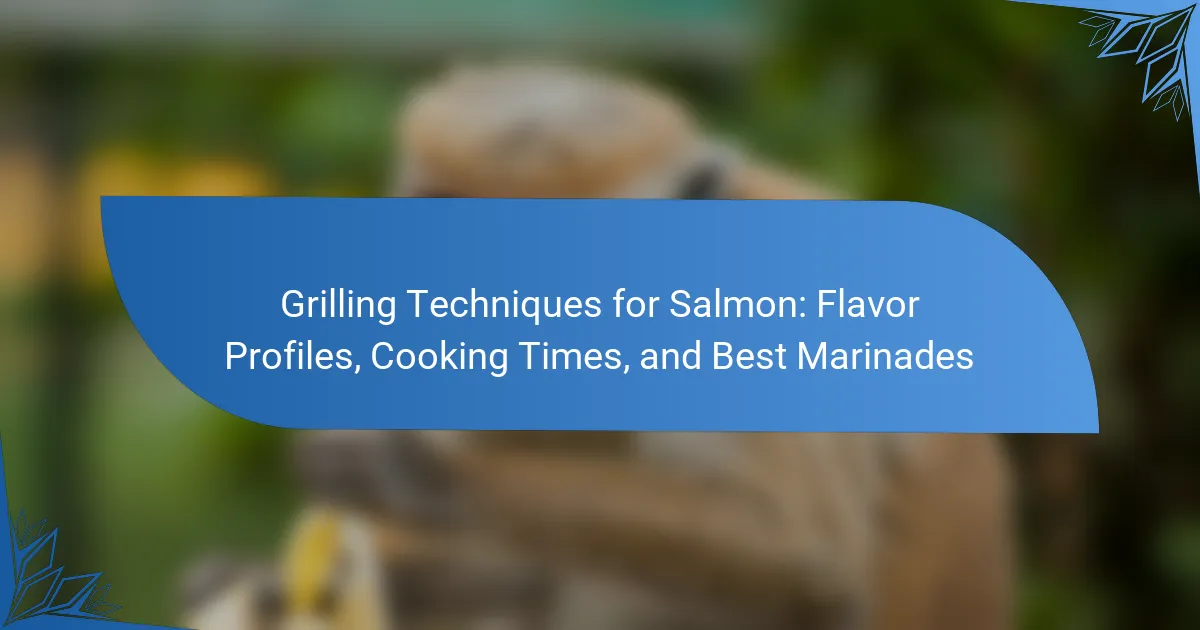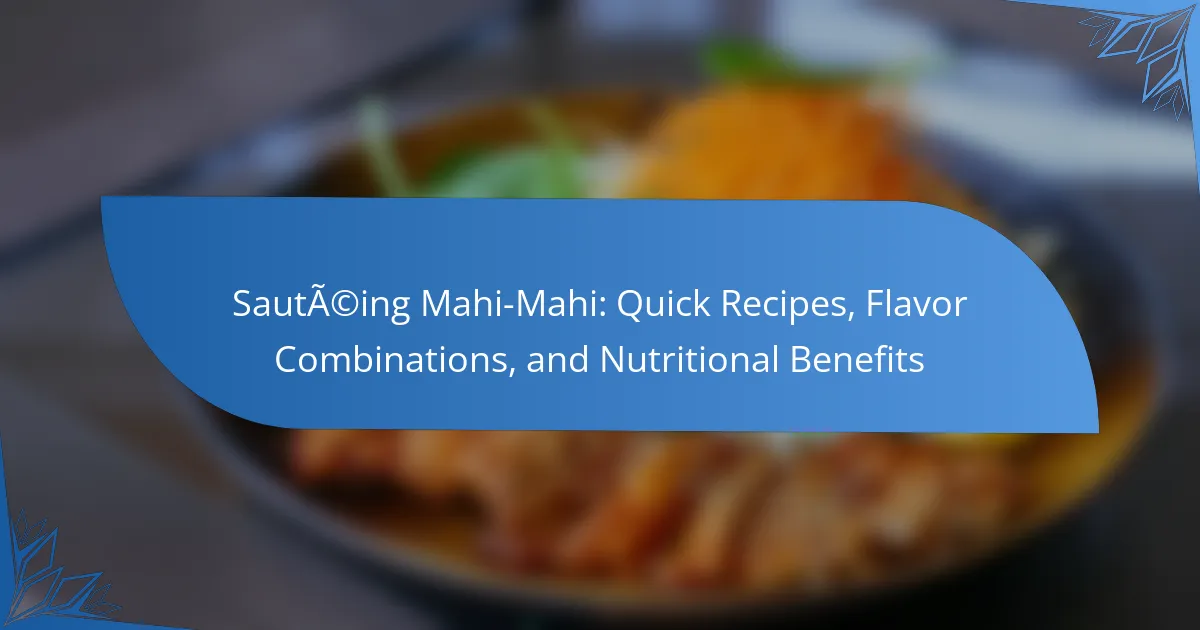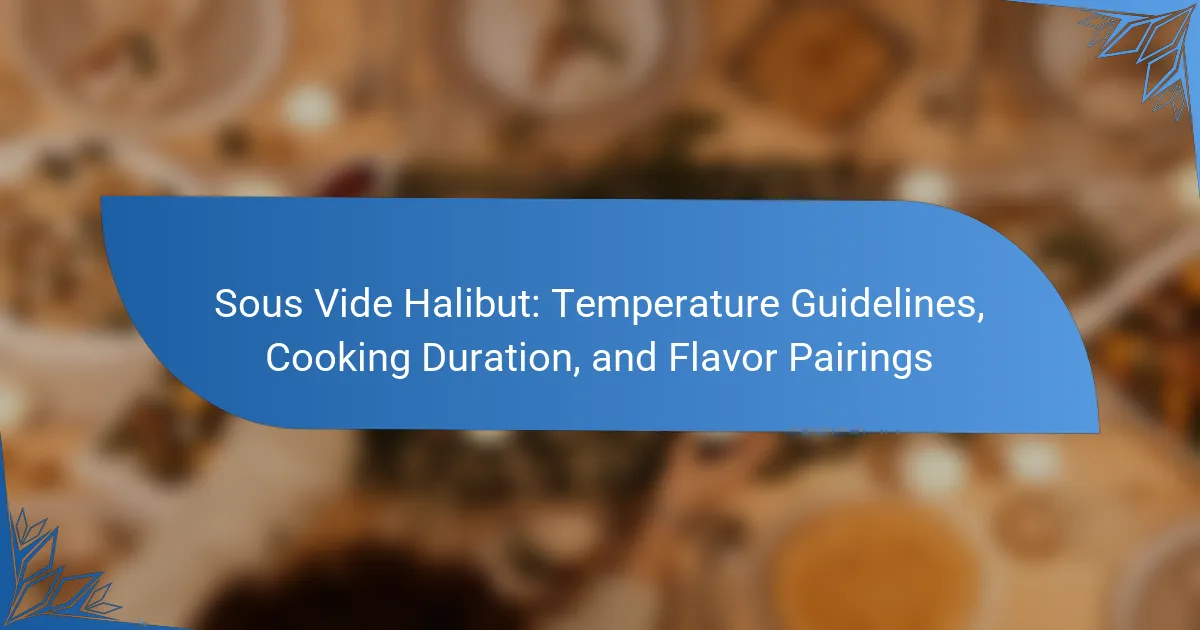
What are the essential grilling techniques for salmon?
The essential grilling techniques for salmon include direct grilling, indirect grilling, and using a cedar plank. Direct grilling involves placing the salmon directly over the heat source. This method cooks the fish quickly, achieving a crispy skin. Indirect grilling requires placing the salmon away from the direct heat. This technique allows for slower cooking, resulting in a moist texture. Using a cedar plank infuses the salmon with a subtle smoky flavor. The plank helps prevent the fish from sticking to the grill. Additionally, marinating the salmon enhances its flavor and moisture. Properly preheating the grill is crucial for even cooking. These techniques ensure a flavorful and perfectly cooked salmon dish.
How do different grilling methods impact salmon flavor?
Different grilling methods significantly impact salmon flavor. Direct grilling provides a charred, smoky taste due to high heat. This method enhances the natural oils in salmon, creating a rich flavor. Indirect grilling, on the other hand, offers a more subtle flavor. It allows for even cooking without charring, preserving the fish’s delicate taste.
Using cedar planks infuses a unique woodsy flavor into the salmon. The plank absorbs heat and moisture, preventing the fish from drying out. Smoking salmon adds a deep, complex flavor profile. The type of wood used for smoking also influences the final taste.
Marinades and seasonings interact with grilling methods to enhance flavor. For example, acidic marinades can tenderize and add zest, while dry rubs create a flavorful crust. Each method brings out different attributes of the salmon, allowing for diverse culinary experiences.
What are the advantages of direct grilling versus indirect grilling for salmon?
Direct grilling offers quicker cooking times and enhanced flavor for salmon. It allows for a crispy exterior while maintaining a moist interior. This method exposes salmon directly to high heat, resulting in caramelization. The intense heat promotes the Maillard reaction, enhancing the fish’s natural flavors. In contrast, indirect grilling cooks salmon more slowly and evenly. This method reduces the risk of overcooking. However, it may not achieve the same level of flavor intensity. Studies show that direct grilling can produce a more desirable texture and taste in fish. Therefore, for those seeking a robust flavor and quicker preparation, direct grilling is advantageous.
How does the choice of grill (gas, charcoal, electric) affect the grilling process?
The choice of grill affects the grilling process by influencing heat control, flavor, and cooking time. Gas grills provide consistent heat and quick temperature adjustments. They typically heat up faster than charcoal grills. Charcoal grills impart a distinct smoky flavor to the food. This flavor comes from the combustion of charcoal. Electric grills offer convenience and ease of use. They are ideal for indoor grilling with less smoke. Each grill type requires different cooking times for salmon. For example, charcoal may take longer to reach the desired temperature. Gas grills allow for more precise cooking control. Overall, the choice of grill significantly impacts the grilling experience and results.
What are the key flavor profiles associated with grilled salmon?
Grilled salmon typically features key flavor profiles of smoky, savory, and slightly sweet notes. The grilling process imparts a smoky flavor due to the char from high heat. Salmon’s natural richness contributes to its savory taste. Additionally, marinades often used with grilled salmon, such as teriyaki or honey glaze, add a hint of sweetness. Citrus elements like lemon or lime are frequently included, enhancing the overall flavor with acidity. Herbs such as dill or parsley can also complement the fish, providing freshness. These combined elements create a well-rounded flavor experience that is both complex and appealing.
How do marinades enhance the flavor of grilled salmon?
Marinades enhance the flavor of grilled salmon by infusing it with complementary ingredients. They typically contain acids, oils, and seasonings that penetrate the fish. Acids, such as lemon juice or vinegar, tenderize the salmon while adding brightness. Oils help to retain moisture during grilling, preventing dryness. Seasonings, including herbs and spices, contribute depth and complexity to the flavor profile.
Research shows that marinating for at least 30 minutes can significantly improve taste. For example, a study published in the Journal of Food Science found that marinated fish had a more pronounced flavor compared to unseasoned fish. This highlights the effectiveness of marinades in enhancing grilled salmon.
What spices and herbs pair well with salmon on the grill?
Dill, parsley, and thyme pair well with salmon on the grill. These herbs enhance the fish’s natural flavor. Dill adds a fresh, slightly tangy taste. Parsley contributes a mild, earthy flavor. Thyme offers a subtle herbal note that complements salmon. Additionally, spices like paprika and black pepper can be used. Paprika provides a smoky sweetness. Black pepper adds a touch of heat. Lemon zest is also a great addition. It brightens the dish and balances the richness of the salmon.
What are the recommended cooking times for grilling salmon?
The recommended cooking times for grilling salmon are approximately 6 to 8 minutes per side for fillets. This timing applies when grilling at a medium heat of about 375°F to 400°F. For thicker cuts, such as steaks, grilling may take 8 to 10 minutes per side. Salmon is considered done when it reaches an internal temperature of 145°F. Cooking times can vary based on the thickness of the salmon and the heat of the grill. Always check for flakiness as an indicator of doneness.
How does the thickness of salmon fillets influence cooking time?
The thickness of salmon fillets significantly influences cooking time. Thicker fillets require a longer cooking duration compared to thinner ones. For instance, a fillet that is one inch thick typically takes about 10 to 12 minutes to cook. Conversely, a fillet that is half an inch thick may only need 6 to 8 minutes.
This difference arises because heat penetrates thicker fillets more slowly. As a result, the internal temperature takes longer to reach the desired level of doneness. Cooking salmon to an internal temperature of 145°F ensures it is safe to eat.
A general rule is to allow 4 to 6 minutes of cooking time per half-inch of thickness. This guideline helps achieve consistent results when grilling salmon.
What are the best techniques for checking salmon doneness while grilling?
The best techniques for checking salmon doneness while grilling include using a food thermometer, checking the color, and testing the flakiness. A food thermometer should read 145°F (63°C) for perfectly cooked salmon. The flesh should appear opaque and slightly pink in the center. Pressing the salmon with a fork should cause it to flake easily. These methods ensure that the salmon is safe to eat and retains moisture.
How can I create the best marinades for grilled salmon?
To create the best marinades for grilled salmon, combine ingredients that enhance its natural flavor. A simple marinade can include olive oil, lemon juice, garlic, and fresh herbs. The oil keeps the salmon moist while grilling. Lemon juice adds acidity, brightening the flavor. Garlic contributes depth, and herbs like dill or parsley offer freshness.
Marinate the salmon for at least 30 minutes, allowing flavors to penetrate. Do not exceed two hours, as the fish can become mushy. For added sweetness, consider honey or maple syrup in the marinade. These ingredients caramelize during grilling, creating a delicious crust.
Use a 3:1 ratio of oil to acid for optimal results. This ratio balances flavor without overpowering the fish. A study from the Journal of Food Science confirms that marinating improves the sensory qualities of fish.
What are some popular marinade ingredients for salmon?
Popular marinade ingredients for salmon include soy sauce, lemon juice, garlic, and honey. Soy sauce adds umami flavor and saltiness. Lemon juice provides acidity and brightness. Garlic offers aromatic depth. Honey contributes sweetness and balances flavors. Other common ingredients are olive oil and herbs like dill or parsley. These components enhance the natural taste of salmon while adding complexity.
How long should salmon marinate before grilling for optimal flavor?
Salmon should marinate for 30 minutes to 2 hours before grilling for optimal flavor. A shorter marinating time enhances the natural taste without overpowering it. A longer marinating period allows the flavors to penetrate more deeply. However, marinating for more than 2 hours can lead to a mushy texture due to the acidity in many marinades. This timeframe balances flavor infusion and texture preservation effectively.
What tips can help improve my salmon grilling experience?
To improve your salmon grilling experience, start with high-quality, fresh salmon. Fresh salmon has better flavor and texture. Next, marinate the salmon for at least 30 minutes. Marinades enhance the taste and can include ingredients like lemon juice or soy sauce. Preheat your grill to medium-high heat. A properly heated grill prevents sticking and ensures even cooking. Use a fish spatula for flipping the salmon. This tool is designed to handle delicate fish without breaking it. Grill the salmon skin-side down first. This helps to keep the fish moist and flavorful. Aim for a cooking time of about 6-8 minutes per side, depending on thickness. The internal temperature should reach 145°F for safe consumption. Lastly, let the salmon rest for a few minutes after grilling. Resting allows the juices to redistribute, enhancing flavor and moisture.
How can I prevent salmon from sticking to the grill?
To prevent salmon from sticking to the grill, preheat the grill thoroughly. A hot grill creates a sear that helps release the fish. Apply oil to the grill grates using a paper towel soaked in vegetable oil. This creates a non-stick surface. Additionally, consider marinating the salmon before grilling. Marinades add moisture and create a barrier against sticking. Use a fish basket or aluminum foil for easier handling. These methods have been shown to reduce sticking significantly.
What are common mistakes to avoid when grilling salmon?
Common mistakes to avoid when grilling salmon include using high heat, not oiling the grill, and overcooking the fish. High heat can cause the salmon to burn on the outside while remaining raw inside. Not oiling the grill can lead to sticking, making it difficult to flip the salmon without breaking it apart. Overcooking salmon results in a dry texture; it should be cooked to an internal temperature of 125°F to 130°F for optimal moisture. Additionally, using skin-on salmon can help protect the flesh from direct heat and keep it moist. Not allowing the salmon to come to room temperature before grilling can also lead to uneven cooking. Lastly, neglecting to season the salmon adequately can result in bland flavor.
The main entity of this article is grilling techniques for salmon. It covers essential methods such as direct grilling, indirect grilling, and using cedar planks, each impacting flavor and texture differently. Key points include recommended cooking times based on thickness, the influence of various grilling methods on flavor profiles, and the importance of marinades and seasonings. Additionally, the article discusses the effects of different grill types on the grilling process and offers tips for preventing sticking and ensuring optimal doneness.


